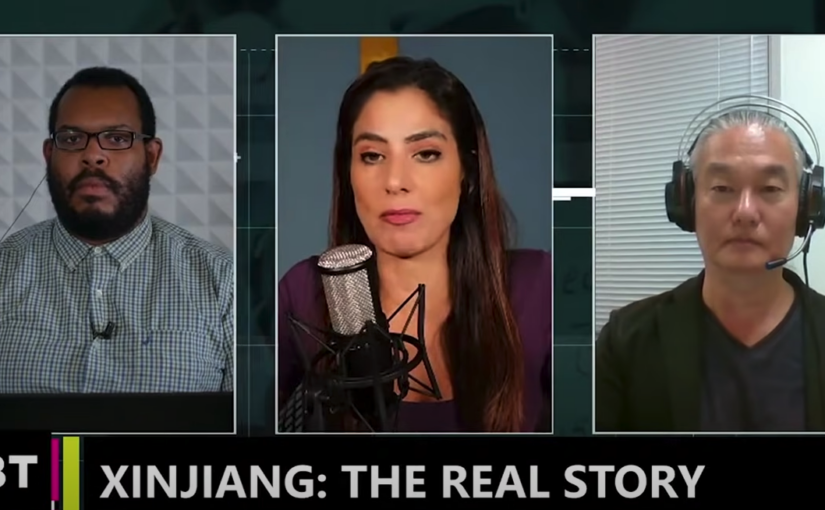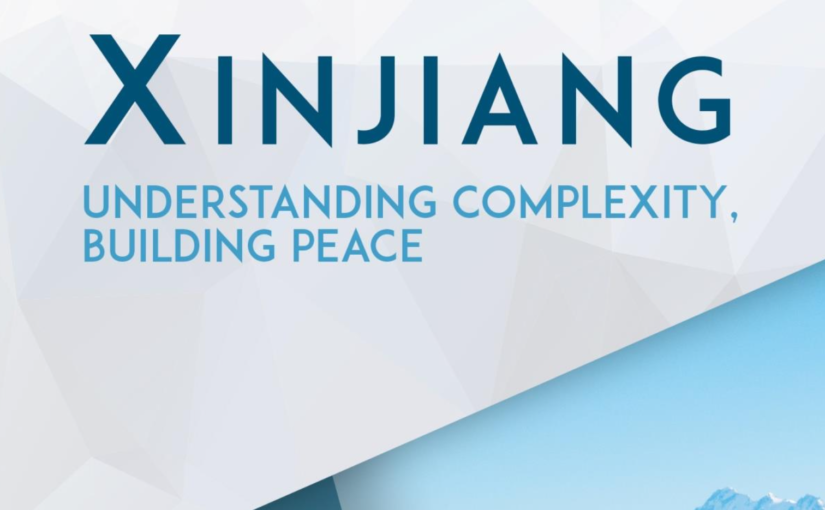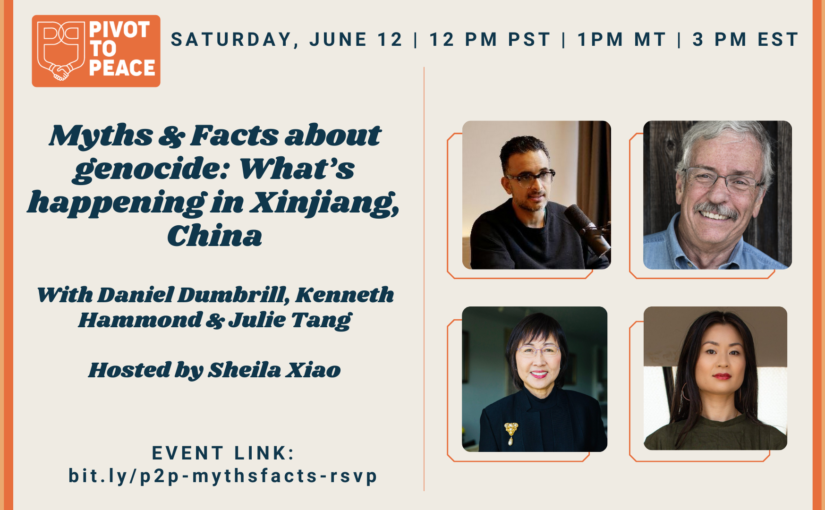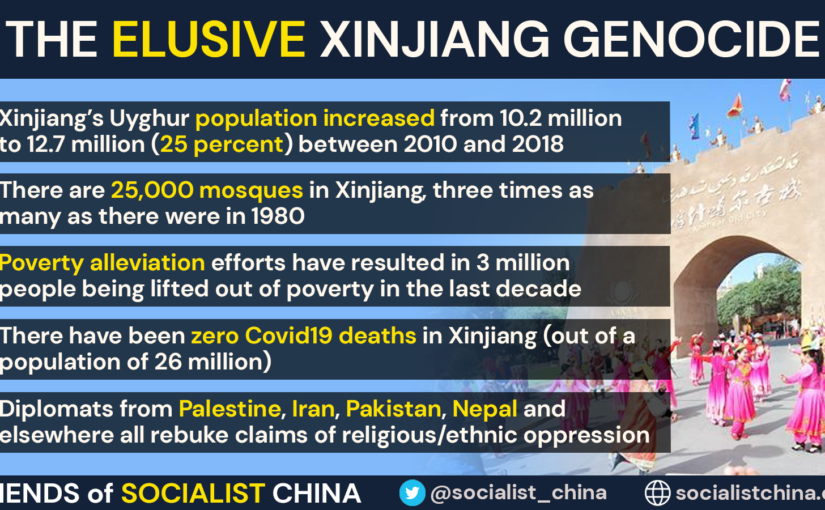In this recent interview on BreakThrough News, peace activist and East Asian studies scholar KJ Noh debunks several of the most popular myths regarding the supposed cultural genocide of Uyghur Muslims in Xinjiang. He also describes the contents of the recent European academic study about terrorism and counter-terrorism measures in the region.
Category: Xinjiang
Interview on the ‘Uyghur Tribunal’ and the media war against China
Friends of Socialist China co-editor Carlos Martinez was interviewed on the World Today podcast by Anna Ge, on the subject of the ‘Uyghur Tribunal’ and the latest round of accusations regarding China’s treatment of Uyghurs in Xinjiang.
The segment is embedded below, along with a transcript.
Anna:
You’re listening to World Today. Some Western media outlets have started hyping another report wrote by the infamous anti China activist Adrian Zenz. The report claimed there will be millions fewer Uyghurs and other ethnic minority newborns in China’s Xinjiang Uyghur Autonomous Region in the next 20 years. But how did he come to this sensational conclusion, how reliable is his study? To delve into these questions and more, we’re joined by Carlos Martinez from London. He’s an author and activist. Thanks for joining us, Carlos. So first of all, how much faith can we put into this report based on the data samples and methodology Zenz used?
Carlos:
So there are two things that we need to look at here. One is the data samples and methodology, the actual scientific validity of the study. And the other is the way that it’s reported. Because for the vast majority of people that see this study, they’re going to see the headlines, they’re going to see maybe a few sentences from an article, they’re not going to take a close look at the data.
Now, in terms of the methodology, Adrian Zenz has really honed this method over the course of several years. He gets lots of data from lots of places, he throws it all together. And then he tries to find the subset, the small piece of that data, that seems to prove what he wants it to prove, his hypothesis. And that’s a classic technique that people use to lie with statistics, to make statistics work for them. The correct scientific approach is to analyze all the data you have, and see if it confirms your hypothesis or not, not to narrow the sample down in a very specific way, until the data tells the story you want it to.
An equivalent example might be, maybe I’ve got a hypothesis that people read more books than they used to 10 years ago. So I start by asking a random sample of 100 people: how many books did you read 10 years ago? And then I go and stand outside a bookshop or a library and ask another 100 people, how many books did you read this year? Obviously, the average is going to be higher now, but not because 10 years have passed, but because I’ve selected the sample that’s going to give me the answer that I want. And this is what Zenz has done, essentially, he has narrowed in on a very small subset of data for one year, in a section of Xinjiang, in southern Xinjiang. And on the basis of that data, he projects that the population growth rate will reduce by 1/3.
But then, his study gets blanket coverage in the Western media. And the headlines also, that the Uyghur population number is going to reduce by 1/3. Now to cut actual population numbers by a third in 20 years, not only do you have to stop anybody from having children, but you also actively have to kill a few million people on top of that. So the whole thing is just ludicrous and unbelievable.
The population growth rate might be declining somewhat. But that’s actually the case throughout China for a number of reasons including urbanization, people joining the workforce, people going into higher education and so on. But actually we’ve seen that over the last decade, the Uyghur population in Xinjiang increased by 25% compared to the Han population, which increased by just 2%. So this latest study from Zenz is really just something that really be ignored but in fact is being given blanket media coverage in the West and is feeding into this overall story that we have of China committing a genocide or a cultural genocide in Xinjiang.
Anna:
You have visited China before. What is your impression about China and Xinjiang? Is there a gap between Xinjiang in western media and in your personal experience?
Carlos:
Yes, I would say there’s a big gap. I went to Xinjiang, specifically to Urumqi, in January last year. In terms of my expectation, going on the basis of what I had seen in the Western media before I went, I thought I would witness the intense repression of Uyghur Muslims. I didn’t think that I would see Uyghur people and other ethnicities living ordinary lives, engaging in their customs, engaging in their traditions. But actually, that’s exactly what you do see in Xinjiang. I mean, the group I was in, we didn’t have an official guide. We weren’t being told where to go by a CPC or government official. We walked around freely. We saw mosques everywhere. We saw many hundreds of Uyghur Muslims wearing distinctive clothing, walking, working, and definitely not seeming like they were in fear of being persecuted. In fact, you go to the central area and you see many people, especially older people dancing outside to traditional Uyghur music. We ate in Uyghur restaurants, the food was halal, there was no alcohol available.
All the street signs have both Chinese and Uyghur writing, one sees newspapers, one sees magazines in Uyghur script, so the feeling I got was one of not just ethnic diversity, but also of harmonious relations. If I compare it with Australia, which is a country that I’ve visited several times, the indigenous population in Australia is an oppressed minority who are prevented from living their traditional ways of life, who suffer from a much lower life expectancy than the rest of the population, from much lower educational attainment and outcomes, much higher prison rate and so on. If you go to an Australian town, any Australian town really, you can see that the situation for indigenous people there is disastrous. And the state, the government does very little to help those people. And there is ethnic conflict rather than ethnic harmony. It would be unusual for example, if I went into a cafe in Brisbane, to see a European-Australian and an Indigenous Australian, working together or having, you know, a normal friendly relationship. But it wouldn’t be at all unusual in Urumqi or Kashgar to see a Uyghur person and a Han person working together and being friends.
So yes, I would say in terms of the what I see about Xinjiang in Western media and my personal experience, there’s an enormous gap.
Anna:
It seems that China’s Xinjiang has increasingly become a card played by the West. Recently, China has dismissed a so called Uyghur tribunal set up in the United Kingdom, to hear allegations of human rights abuses in Xinjiang. What do you make of the legitimacy of the tribunal and the motivation behind it?
Carlos:
Well, I think it’s fairly clear that the so called tribunal has got no basis in international law. It’s part of an ongoing and quite wide ranging and long term propaganda campaign. And in turn, it’s clear that propaganda campaign is part of a US led New Cold War project, which is, is pretty well known that it’s designed to slow down China’s rise, and to try and maintain a unipolar world in which the US leads, in which the US enjoys hegemony, in which the US can structure international relations in order to serve the interests not of humanity but its own interests. If China keeps growing, and it keeps promoting and pushing a system of multipolarity, which is a more democratic framework of international relations, then the US doesn’t get to impose its will on the world any more.
China’s economy is growing, right? China has wiped out extreme poverty, China has shown that it can deal with a huge threat like the pandemic, China is taking the lead in trying to prevent climate breakdown, which is the number one threat facing humanity. And is actually the sort of thing where, in the West, we like to think we’re in charge of dealing with climate breakdown, because we’re more civilized, we’re more enlightened than the rest of the world. But actually, China’s taking the lead on that. And every success that China has is a sort of ideological blow to this capitalist or neoliberal orthodoxy. So that’s really why the US and its allies are obsessed with slandering China, making it look bad, trying to prevent other countries from working with it, trying to slow down its rise, trying to cut it out of of global value chains, trying to prevent it from having access to certain raw materials, and elements of technology, and so on.
The Uyghur tribunal fits into a more generalized setup of information warfare that the US and its allies are waging against China.
Eurispes academic report: Xinjiang – understanding complexity, building peace
We are pleased to republish this academic study by Eurispes – Istituto di Studi Politici Economici e Sociali, Centro Studi Eurasia-Mediterraneo and Istituto Diplomatico Internazionale, which provides a rigorous analysis of the situation in Xinjiang, in particular the emergence of the separatist terrorist movement and the Chinese government’s response.
The report provides a crucial corrective to the ‘Uyghur genocide’ narrative that has become pervasive in much of the West. We are republishing the English version, with permission. The original can be accessed in English and Italian from the Centro Studi Eurasia-Mediterraneo website.
Abstract
Over the past year, the Western media has given considerable attention to the Xinjiang Uyghur Autonomous Region (XUAR). Newspapers, television programs and, above all, social media users have focused in particular on the alleged repression, by the Chinese government, of the local Uyghur community, a predominantly Islamic ethnic group with its own language (Uyghur, of Turkic origin) that has lived in the region for centuries, accounting for just over half of the total population. In Europe, the issue has caused consternation and indignation in public opinion, to the point of influencing politics, and convincing the foreign ministers of the member countries of the European Union to approve sanctions against some Chinese officials considered to be particularly implicated – according to the allegations – in the so-called “Uyghur genocide”.
However, the accounts and testimonies coming out of China, as well as from foreign journalists, diplomats, experts, students and professionals who have had and continue to have the chance to visit Xinjiang and its cities and counties, tell a very different story, which seriously undermines the West’s charges.
The detention and re-education camps, are, in fact, shown to be confinement and de-radicalisation centres for men and women affiliated with terrorist groups, such as the East Turkestan Liberation Organization (ETLO) and the Eastern Turkestan Islamic Movement (ETIM), which for several years have been carrying out attacks not only in Xinjiang but elsewhere in China as well, and even abroad, against Chinese targets (diplomatic representations, tourist groups or companies) or targets of other nature, as evidenced by the presence, reported in recent years, of ethnic Uyghur fighters among the ranks of ISIS in the Syrian and Iraqi conflicts.
This report thus seeks to shed light on a topic – that of the social and political situation in Xinjiang – that is much broader and more complex than the simplistic accounts and allegations of the Western mainstream press, whose sensationalistic narrative risks generating serious diplomatic tensions, undermining consolidated bilateral or multilateral cooperation platforms and, last but not least, providing sectarian, violent and subversive groups with a very dangerous political and moral legitimacy.
Continue reading Eurispes academic report: Xinjiang – understanding complexity, building peacePivot to Peace event: Myths & Facts about genocide – what’s happening in Xinjiang
Pivot to Peace are organising this important event on Saturday 12 June 2021, 3pm US Eastern, 12pm US Pacific, 8pm Britain.
The Biden Administration has chosen to echo the same propaganda claims against China that were made by Trump’s Secretary of State Mike Pompeo. Both the Trump & Biden administration are charging the Chinese government with the crime of genocide against a minority people, the Uighurs, in Xinjiang Autonomous Region in western China. This campaign coincides with an economic war with China, which includes tariffs and sanctions. It also comes as the Pentagon has announced a new military doctrine which prioritizes and prepares the United States with a war on China.
What are the facts? Is China actually carrying out a genocide against this minority Muslim population? Or, is this one more demonization campaign waged by the US government against a targeted country in preparation for confrontation? After-all, the US insisted that Saddam Hussein was a threat to world peace because Iraq possessed Weapons of Mass Destruction, and used that rationale to justify a war against Iraq. There were no Weapons of Mass Destruction. That war that took more than one million lives, was based on lies.
The webinar will feature a Canadian journalist who has been covering the events in Xinjiang, there will also be a historical review of the US government’s involvement in genocide against indigenous people in what is now the United States. And there will be eyewitness reports from legal experts and scholars who have visited Xinjiang.
Speakers include:
- Canadian Youtuber Daniel Dumbrill
- Professor of History, Gerald Horne
- Professor of East Asian and Global History, Kenneth Hammond
- Superior Court Judge, Julie Tang, Retired
- Pivot to Peace co-founder, Sheila Xiao
Register for the event here: http://bit.ly/p2p-mythsfacts-rsvp
The event can also be watched here: https://fb.me/e/49mjrnE0a
The elusive Xinjiang genocide
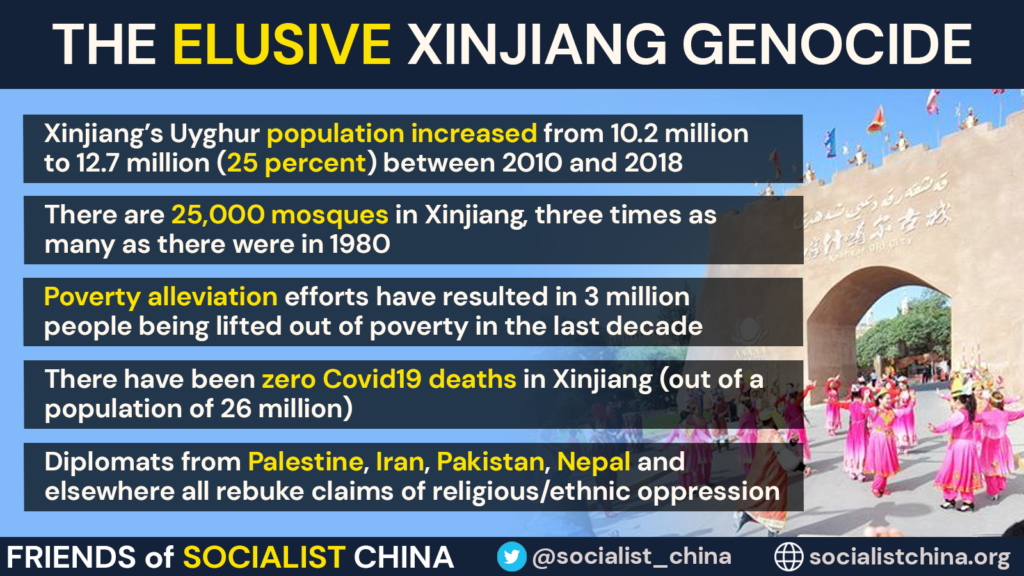
Explainer: What’s going on in Xinjiang?
In this video, Friends of Socialist China co-editor Carlos Martinez goes into detail about the situation in Xinjiang. What are the accusations being made? Who is making the accusations? What’s the state of the evidence? What reasons would the Western media and political class have for making so much noise about Xinjiang?
